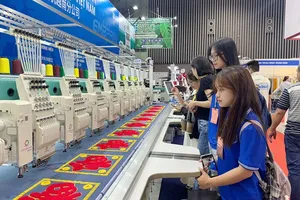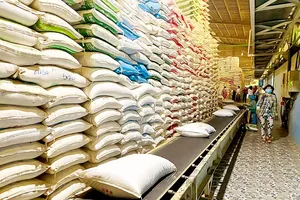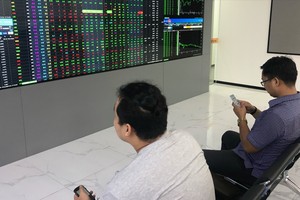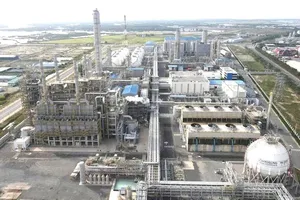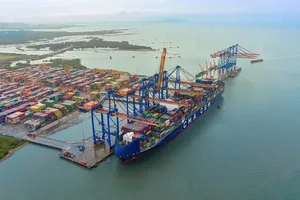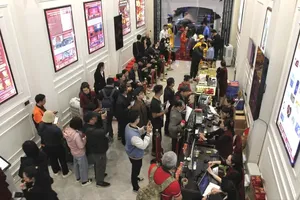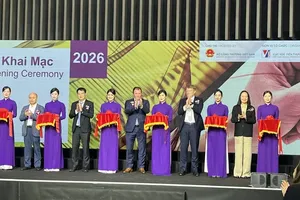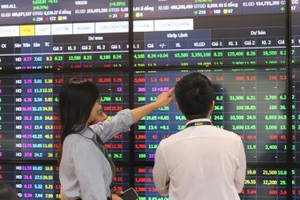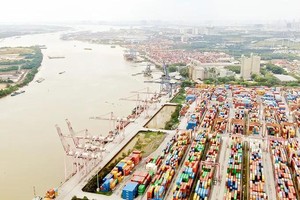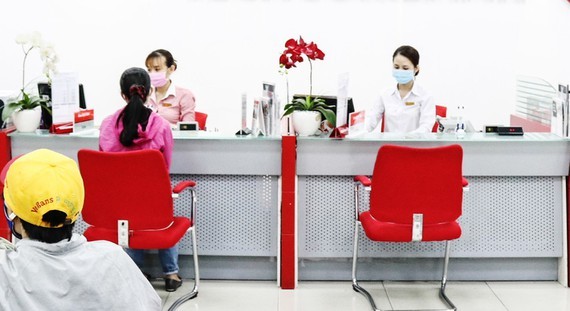 Some commercial banks still provide real estate loans but their policies are not the same for all borrowers. (Photo: SGGP)
Some commercial banks still provide real estate loans but their policies are not the same for all borrowers. (Photo: SGGP)
Recently, some commercial banks have stopped disbursing real estate loans and given priority to other areas because the credit limit in the first quarter of 2022 is almost full. Many commercial banks also said that they would tighten credit control for real estate projects, such as villas and resorts, because the liquidity of this segment would be low in the future. Thuy Tien, living in Thu Duc City, Ho Chi Minh City, said that she bought a condotel of a resort project in Phu Quoc. According to the progress, she has paid 30 percent of the total asset value and will continue to pay another 30 percent in June. However, as the SBV requires commercial banks to strictly control credit for investment in high-end real estate, resort, and speculative real estate projects, the commercial bank has recently announced that it will not disburse loans to investors. “If commercial banks do not lend me money, I do not know where to get money to pay following the schedule. If I fail to make the next payment, I will violate the contract and be fined for late payment and late payment interest. But now, if I cancel the contract, I will lose the deposit, so I do not know how to handle it," Thuy Tien said worriedly. Meanwhile, some commercial banks still ensure the disbursement of loans for consumer real estate because of high demand and high liquidity in this segment. Some banks are still willing to provide loans to high-end real estate projects. Specifically, for the Grand Marina Saigon project in District 1, HCMC, with a selling price of about VND35 billion (US$1.51 million) per 84-square-meter apartment, Techcombank lends up to 100 percent of the apartment value. At the same time, if customers have mortgaged real estate assets equivalent to 40 percent of the apartment value, they will be exempted from the interest rate for 24 months. Many commercial banks also said they still give loans to real estate projects, but their policies are not the same for all borrowers. According to Mr. Nguyen Dinh Tung, General Director of OCB, real estate credit at OCB includes both business and consumer loans. However, the real estate projects that OCB lends money are mostly from partners, creating a source of goods for individual customers to borrow to buy houses through links with investors. "Although the general policy is to limit real estate lending, it is mainly about the disbursement of real estate investment and trading, while loans to buy, build, and repair houses are still encouraged," said Tung. As a bank with a quite high real estate credit balance in the banking industry, Mr. Jens Lottner, CEO of Techcombank, said that Techcombank had not had any problems with real estate loans in the past five years. Therefore, the lender will continue to provide real estate loans. “Real estate is currently an important sector for the economy, but the housing supply has not yet met the needs of people. Currently, real estate credit is tightened to limit speculative activities, but, in the long term, we expect there will be good investment opportunities for Vietnamese people," said Mr. Jens Lottner.Diversified capital sources According to the HCMC Real Estate Association (HoREA), if both credit capital and capital from corporate bonds are controlled, the real estate market, businesses, investors, consumers, and even banks will possibly face difficulties. Because credit is currently an important and main source of capital for real estate businesses in the context that Vietnam's capital market is extremely limited. The immediate shutdown will instantly affect unfinished projects, thereby, making the supply scarcer. Recently, in a Government report, besides issuing a warning that many real estate businesses mobilize capital through large-scale bond issuance with high-interest rates which will pose risks to the market, the Ministry of Construction also suggested that it is necessary to evaluate again Decree No.153/2020 on the offering and trading of corporate bonds in the domestic market and the offering of corporate bonds to the international market in the direction of clarifying the issuer, requiring the different priorities or restrictions. In fact, to adapt to a narrower credit flow for real estate, many real estate enterprises have flexibly found ways to carry out their projects. A representative of TTC Land said that feasible and legally qualified projects can completely convince credit institutions, as well as partners, to provide financial support. The leader of Nam Long Investment Joint Stock Company also said that banks still maintained a lending policy for projects that are legally qualified and licensed to sell. To diversify capital sources for the project, this company has recently cooperated with some Japanese partners and international financial institutions to jointly develop the project and provide financial support. Some other real estate enterprises have also mobilized and exploited foreign capital. Statistics show that in the first three months of 2022, real estate ranked second among the sectors that attracted the most FDI capital, with a total investment capital of nearly US$2.7 billion, accounting for about 30.3 percent of total FDI capital registered in Vietnam.
The SBV - HCMC Branch said that the credit balance of the housing support credit package of VND30 trillion (more than $1.29 billion) had ended in 2016. The loan repayment activity of this credit package is fairly positive. Currently, the interest rates for loans to buy and rent-to-own social housing and loans for home repair and construction are maintained at an interest rate of 4.8 percent per annum by the SBV in 2022. However, the supply of affordable housing suitable for workers has been very limited over the past time, making it difficult for commercial banks to find good loan plans.
The housing report sent by the People's Committee of HCMC to the Ministry of Construction said that in the first three months of 2022, the city only had five projects eligible to raise capital to sell houses formed in the future, with a total number of 1,172 units. In the first quarter of 2022, HCMC did not give permission to any projects on affordable housing, social housing, and worker housing.
The housing report sent by the People's Committee of HCMC to the Ministry of Construction said that in the first three months of 2022, the city only had five projects eligible to raise capital to sell houses formed in the future, with a total number of 1,172 units. In the first quarter of 2022, HCMC did not give permission to any projects on affordable housing, social housing, and worker housing.
